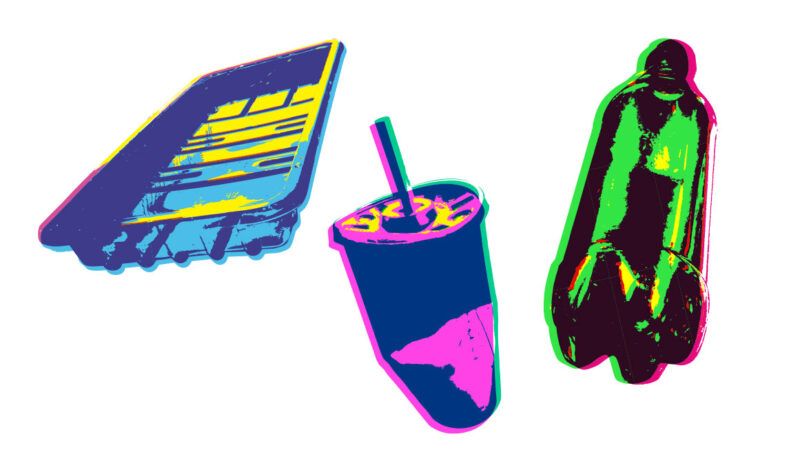Plastic, Perfected
Researchers have developed a promising and "infinitely recyclable" plastic called polydiketoenamine.

Useful and infinitely malleable, plastics are ubiquitous in modern life. They are also a mixed blessing.
Plastic detritus litters landscapes and befouls the oceans, and Americans are estimated to ingest about nine ounces of microplastics a year. The U.S. annually generates about 280 pounds of plastics per capita. Despite all the earnest sorting by householders, only about 9 percent of plastics is actually recycled, while 16 percent is incinerated. The remaining 75 percent is landfilled, accounting for 12.2 percent of municipal solid waste.
But there is reason for optimism that we can have unproblematic plastics.
One of the biggest obstacles to recycling current plastics is that they are usually mixed with dyes, adhesives, and metals that make isolating the plastics energy-intensive and expensive. Most current plastics also become increasingly brittle as they get recycled, which is why it's much cheaper to manufacture virgin plastics out of fossil fuels. Fortunately, several research groups and companies are developing and deploying more recycling-friendly plastics.
A team of researchers at the U.S. Department of Energy's Lawrence Berkeley National Laboratory has developed an "infinitely recyclable" plastic called polydiketoenamine, or PDK. Items made of PDK can be bathed in acid that separates the plastic molecules from any additives; this material can then be reassembled into different shapes, textures, and colors again and again without loss of performance or quality. While producing virgin PDK resin is initially expensive, the researchers calculate that recycled PDK resin will be competitive with petroleum-based virgin plastic resins.
Meanwhile, the Israeli company UBQ Materials converts 100 percent unsorted household waste—containing food, mixed plastics, paper, cardboard, and packaging materials—into a composite thermoplastic material that can replace plastic polymers in hundreds of applications. An independent life-cycle analysis found that every ton of UBQ material produced prevents greenhouse emissions equivalent to 11.7 tons of carbon dioxide. While regular plastics degrade after their first use, UBQ says its product—which is already being used by Daimler, McDonald's restaurants, and Keter Group, an Israeli furniture manufacturer—can be recycled more than five times without degrading.
Another team of researchers at the University of Delaware's Center for Plastics Innovation has developed a novel catalyst and a unique, low-temperature process to quickly break down hard-to-recycle single-use plastics, including polypropylene, polystyrene, and everyday polyethylene bottles and bags. Instead of burying or directly burning these plastics, the new technique turns them into higher-value lubricants and diesel, jet, and gasoline fuels.
Given innovations like these, it is possible that plastics won't pose environmental challenges in the future.


Show Comments (313)